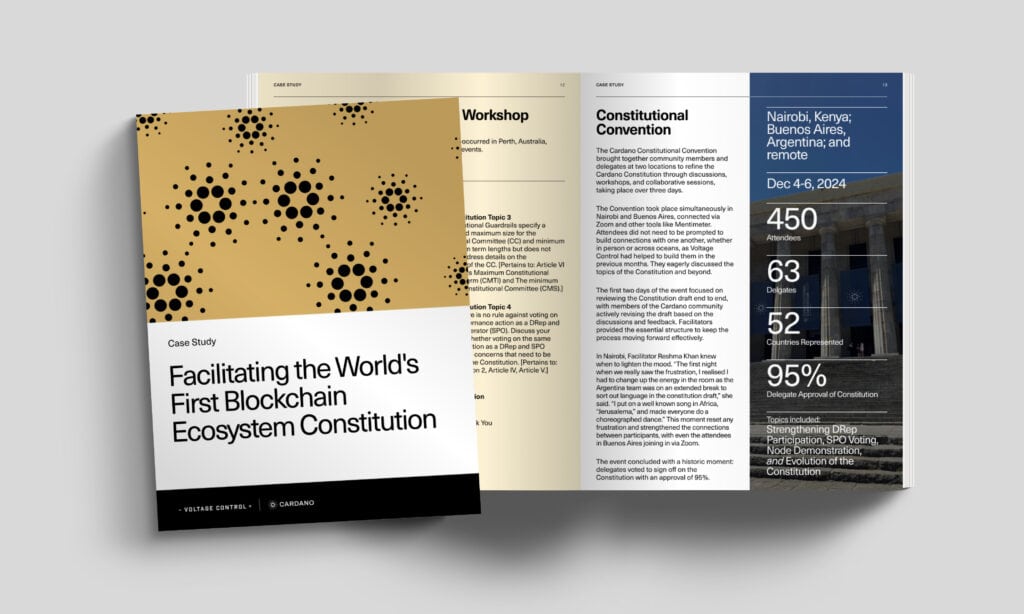Case Study
Facilitating the World's First Blockchain Ecosystem Constitution
You have high-stakes decisions to make. Your teams are global, your organization is decentralized, and every leader brings a valuable perspective. How do you get everyone aligned—without endless meetings or stalled momentum?
At Voltage Control, we engage your community in scalable conversations through custom frameworks that turn complexity into clarity, facilitate critical discussions that lead to real decisions, and decisions that lead to action.
From inception to execution, Voltage Control met the brief perfectly in the design and structure of our global workshop facilitation program. They took the time to understand the nuances of the objectives, tailoring an approach that was not only comprehensive but also designed to foster productive and engaging sessions and usable outcomes.
Charles Hoskinson, CEO of Input I Output and Co-Founder of Cardano
Introduction: Blockchain Ecosystem, Decentralization, and Facilitation
Over three days in December 2024, elected representatives and community members from the Cardano blockchain ecosystem congregated in Buenos Aires, Argentina, and Nairobi, Kenya, to collaborate on a singular, revolutionary objective: to finalize the constitution for a first-of-its-kind, constitutional republic structure for their blockchain governance. This event, the Cardano Constitutional Convention, was one element of a two year process to transition to this new form of on-chain governance, with a constitution written through community input from thousands of international members.
The Cardano blockchain ecosystem sought a bottom-up, egalitarian approach to decision-making and development, which meant their many communities around the globe would have to facilitate consensus on an incredible scale to create and ratify a constitution. No other blockchain ecosystem had done this, especially not on this scale and with this commitment to decentralized, collaboratively-created governance.
To achieve this historic milestone, the Cardano community turned to Voltage Control, whose certified facilitators and coaches were instrumental in designing and facilitating global workshops to help in this ambitious process.
Cardano, like some other blockchains, leverages a decentralized governance model, meaning that no single entity owns or controls the network. Additionally, the Cardano blockchain platform validates and processes both transactions of its native cryptocurrency ada and votes by owners of ada on governance activities. Through these votes, the community decides the direction of Cardano within the bounds of a community-approved, on chain-ratified Constitution.
For the Cardano community to achieve its full vision of on-chain governance, they required a constitution—and that’s where assistance from Voltage Control came into play.
The global network of facilitators from Voltage Control assisted in bringing together stakeholders from around the world, both remotely and in-person, to allow the stakeholders to collaborate in the drafting, revision, and approval of a constitution.
Charles Hoskinson, CEO of Input I Output and Co-Founder of Cardano, identified the importance of a strong facilitation partnership, explaining, “Investing in the facilitation process—spanning 65 workshops in 50 countries—was an incredibly powerful move for our organization. It built genuine trust across a diverse global community, laid a stronger foundation for collaboration, and set the stage for the next wave of innovation in our ecosystem.”
By the end of this process, Cardano became the first blockchain ecosystem to prove that self-sustaining community governance can be put in place by the community itself.
The overall facilitation process offers a ground-breaking framework for organizations well beyond the realms of blockchain and Web3.
You don’t have to understand the intricacies of cryptocurrency and blockchain to embrace the benefits of facilitating decentralized decision-making in your organization. In this case study, we’ll outline the innovative process behind writing Cardano’s constitution—and what we all can learn from it.
The barriers employees must overcome to collaborate are multi-faceted and complex… the office, as traditionally understood, is now located in the cloud.
The overall facilitation process offers a ground-breaking framework for organizations well beyond the realms of blockchain and Web3.
Five Key Values for Facilitating Decentralized Decision-Making
Centralized decision-making has become the norm in countless businesses and industries today, which can make it challenging to make the shift to decentralization. However, decentralization can offer game-changing benefits, including increased innovation, faster decision-making, improved accountability, and empowered participants. The facilitators from Voltage Control leveraged several essential values to ensure a successful project.
1. Inclusiveness
To successfully work together with so many people all around the world, facilitators and hosts had to collaborate to design workshops that were culturally sensitive to and inclusive of everyone. No one workshop’s feedback was considered more important than any other, and all community members were invited to participate, particularly at the community workshop level.
2. Transparency
A key aspect of decentralized, liquid democracy is transparency. The very nature of blockchain and its immutable ledger supports transparency, as all actions are recorded and unalterable. That type of transparency had to be thoughtfully implemented at workshops and the Constitutional Convention.
3. Engagement
When bringing together a diverse group of people, facilitators will naturally encounter cultural differences, language barriers, and other obstacles to decision-making. To overcome these challenges, facilitators must ensure active engagement and participation in the process, inviting everyone to express their viewpoints with confidence.
4. Responsiveness
The Web3 ecosystem is inherently agile and responsive, and facilitators working in blockchain must prioritize that same nimbleness. A decentralized governance system allows the community to shift focus at any point, and facilitators must be comfortable reacting to a dynamic gathering or process.
5. Preparation
With a decentralized organization, facilitators often work with many different groups of people. Those participants may have different expectations for how much support a facilitator can provide, so proper preparation is essential. When working with Web3, facilitators benefit from learning the basics of the industry and its current trends.
Download the Cardano Case Study
Facilitating the World’s First Blockchain Ecosystem Constitution

Copyright © 2026 Voltage Control. All Rights Reserved. | Privacy Policy


